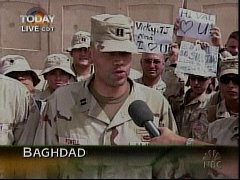 Best of Notable Quotables
Best of Notable Quotables
The 18th Annual Awards for the Year’s Worst Reporting
Matt Lauer in Baghdad: “Talk to me…about morale here. We’ve heard so much about the insurgent attacks, so much about the uncertainty as to when you folks are going to get to go home. How would you describe morale?”
Chief Warrant Officer Randy Kirgiss: “In my unit morale is pretty good. Every day we go out and do our missions and people are ready to execute their missions. They’re excited to be here.”
Lauer: “How much does that uncertainty of [not] knowing how long you’re going to be here impact morale?”|
Specialist Steven Chitterer: “Morale is always high. Soldiers know they have a mission. They like taking on new objectives and taking on the new challenges….”
Lauer: “Don’t get me wrong here, I think you are probably telling me the truth, but a lot of people at home are wondering how that could be possible with the conditions you’re facing and with the attacks you’re facing. What would you say to those people who are doubtful that morale can be that high?”
Captain Sherman Powell: “Sir, if I got my news from the newspapers also, I’d be pretty depressed as well.”
— Exchange on NBC’s Today, August 17.
Among the many jawdropping examples of bias this one highlights what I think is the most important. The war. For many of us the gap between what the major US news organizations say and what is really going on is getting clearer, due primarily to the free exchange of information and opinion made possible by the internet. This year beside the war reporting the bias was apparent in the undercoverage of historic events like the elections in the Middle East, Syrian machinations in and eventual withdrawal from Lebanon, the UN oil for food scandal, Iran’s march toward nuclear weapons and its leader’s bizarre statements, the genocide in Sudan, and the French riots. Just as telling was the ridiculous overexposure of Natalee Holloway, Cindy Sheehan, Wilson/Plame, and the redefinition of “gulag” and “torture”. Those who decide what’s fit to report might consider rejiggering their priorities. As a consumer of news it’s a pain to sift through so much crap to find the intellectually honest reports, but the option is at least available nowadays. The information monopoly is dead.
But back to the point I wanted to make: The bias in the news has killed people this year. People have died in Iraq because the media continues to distort the truth about the nature of our enemy, their attacks, and the success of our efforts against them. The connecting thread of Islam is conveniently overlooked, except where it illustrates the violation of some political correctness taboo. The unknown mother of one dead soldier is elevated above all the rest and provided an unlimited limelight, her more ignorant and bigoted comments and the lack of popular support conveniently muted. In the wake of a new constitution and on the eve of the 3rd election an unknown congressman declares Iraq lost calls for immediate withdrawal and is elevated to hero. About the same time Senator Lieberman’s firsthand observations and opposing opinion go unnoticed. The non-outing of a pair of partisan leakers is portrayed as a major blow against (rather than for) national security. It could even be the Next Watergate™. Meanwhile the Washington Post and New York Times print with glee the real secrets of still more partisan leakers and really do hurt national security. The Pulitzers are already in the mail. Last but not least they report anti-terror measures taken by the government after 9/11 with a scandalous tone – until polls reveal it helps Bush. See? Even though it’s unintentional there is sometimes a right-wing bias in the news.
I made a bit of fun there toward the end, but it really doesn’t fit. The distortion in the reporting from Iraq and relating to the war in general has eroded our morale and lent hope to our enemies. The fighting in Iraq has undoubtedly been more intense and lasted longer because of it. Obviously shit happens in war. How much shit happens is not entirely beyond our control. Maybe the media just doesn’t want to come across as cheerleaders. Instead they come across as ahistoric Chicken Little defeatists. It has made things worse. Is that what they wanted?
Here’s wishing that in 2006 they report more about what’s really going on. Give us some context for the next report on “torture”, secret prisons, and spying. Don’t suppress the grisly images of attacks against us. Don’t gloss over the substance when we get a new message from al Qaeda. Should laymen have to search out jihadi communications themselves? Why are there no 60 Minutes or 20/20 reports on this? Surely it’s better fodder for professional investigative journalists than the drivel they’ve tried to puff up into scandals throughout 2005. What precisely is the difference between moderate Islam and radical Islam? Is the Islamofacist threat over- or underestimated? Considering that the fate of civilization hangs in the balance the mainstream media’s failure to even ask such questions is absurd.
